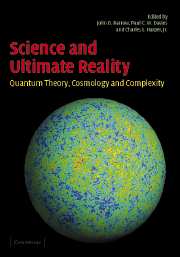Book contents
- Frontmatter
- Contents
- List of contributors
- Foreword
- Editors' preface
- Preface
- Acknowledgments
- Part I An overview of the contributions of John Archibald Wheeler
- Part II An historian's tribute to John Archibald Wheeler and scientific speculation through the ages
- Part III Quantum reality: theory
- Part IV Quantum reality: experiment
- 11 Why the quantum? “It” from “bit”? A participatory universe? Three far-reaching challenges from John Archibald Wheeler and their relation to experiment
- 12 Speakable and unspeakable, past and future
- 13 Conceptual tensions between quantum mechanics and general relativity: are there experimental consequences?
- 14 Breeding nonlocal Schrödinger cats: a thought-experiment to explore the quantum–classical boundary
- 15 Quantum erasing the nature of reality: or, perhaps, the reality of nature?
- 16 Quantum feedback and the quantum–classical transition
- 17 What quantum computers may tell us about quantum mechanics
- Part V Big questions in cosmology
- Part VI Emergence, life, and related topics
- Appendix A Science and Ultimate Reality Program Committees
- Appendix B Young Researchers Competition in honor of John Archibald Wheeler for physics graduate students, postdoctoral fellows, and young faculty
- Index
17 - What quantum computers may tell us about quantum mechanics
from Part IV - Quantum reality: experiment
Published online by Cambridge University Press: 29 March 2011
- Frontmatter
- Contents
- List of contributors
- Foreword
- Editors' preface
- Preface
- Acknowledgments
- Part I An overview of the contributions of John Archibald Wheeler
- Part II An historian's tribute to John Archibald Wheeler and scientific speculation through the ages
- Part III Quantum reality: theory
- Part IV Quantum reality: experiment
- 11 Why the quantum? “It” from “bit”? A participatory universe? Three far-reaching challenges from John Archibald Wheeler and their relation to experiment
- 12 Speakable and unspeakable, past and future
- 13 Conceptual tensions between quantum mechanics and general relativity: are there experimental consequences?
- 14 Breeding nonlocal Schrödinger cats: a thought-experiment to explore the quantum–classical boundary
- 15 Quantum erasing the nature of reality: or, perhaps, the reality of nature?
- 16 Quantum feedback and the quantum–classical transition
- 17 What quantum computers may tell us about quantum mechanics
- Part V Big questions in cosmology
- Part VI Emergence, life, and related topics
- Appendix A Science and Ultimate Reality Program Committees
- Appendix B Young Researchers Competition in honor of John Archibald Wheeler for physics graduate students, postdoctoral fellows, and young faculty
- Index
Summary
Quantum mechanics occupies a unique position in the history of science. It has survived all experimental tests to date, culminating with the most precise comparison of any measurement to any theory – a 1987 measurement of the electron's magnetic moment, or gyromagnetic ratio ge = 2.002 319 304 39 (Van Dyck et al. 1987), agreeing with QED theory to 12 digits. Despite this and other dramatic successes of quantum mechanics, its foundations are often questioned, owing to the glaring difficulties in reconciling quantum physics with the classical laws of physics that govern macroscopic bodies. If quantum mechanics is indeed a complete theory of nature, why does it not apply to everyday life? Even Richard Feynman (1982), a fierce defender of quantum mechanics, memorably stated that:
We have always had a great deal of difficulty in understanding the world view that quantum mechanics represents … Okay, I still get nervous with it … It has not yet become obvious to me that there is no real problem. I cannot define the real problem, therefore I suspect there's no real problem, but I'm not sure there's no real problem.
In the dawn of the twenty-first century, John A. Wheeler's big question “Why the quantum?” has returned to the forefront of physics with full steam. Advances in experimental physics are beginning to realize the same thought-experiments that proved helpful to Einstein, Bohr, Heisenberg, Schrödinger, and the other founders of quantum mechanics.
- Type
- Chapter
- Information
- Science and Ultimate RealityQuantum Theory, Cosmology, and Complexity, pp. 345 - 360Publisher: Cambridge University PressPrint publication year: 2004



